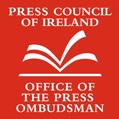 Recent press releases from the Press Council of Ireland have announced two key appointments. Retired diplomat Daithi O’Ceallaigh has been appointed as Chairman of the Press Council from 1 August, succeeding Prof Tom Mitchell (Irish Independent | Irish Times); and retired academic Prof John Horgan has been appointed to a second term as Press Ombudsman from 1 September (Irish Times). Both appointments are for three years. Following the recent recognition of the Press Council for the purposes of Schedule 2 to the Defamation Act, 2009, these appointments are set fair solidify the position of the Ombudsman and the Council in their work to safeguard and promote professional and ethical standards in Irish newspapers and periodicals. The time my therefore be ripe for some hard questions.
Recent press releases from the Press Council of Ireland have announced two key appointments. Retired diplomat Daithi O’Ceallaigh has been appointed as Chairman of the Press Council from 1 August, succeeding Prof Tom Mitchell (Irish Independent | Irish Times); and retired academic Prof John Horgan has been appointed to a second term as Press Ombudsman from 1 September (Irish Times). Both appointments are for three years. Following the recent recognition of the Press Council for the purposes of Schedule 2 to the Defamation Act, 2009, these appointments are set fair solidify the position of the Ombudsman and the Council in their work to safeguard and promote professional and ethical standards in Irish newspapers and periodicals. The time my therefore be ripe for some hard questions.
The UK’s sister organisation to the Press Council, the Press Complaints Commission, has recently completed a thorough and independent review of its governance. The report published earlier this month (pdf) recommended that there should be:
• A clearer role for the Commission;
• Tougher scrutiny rules;
• More industry engagement with the Commission;
• A stronger Board;
• A stronger lay voice on the content of the Editors’ Code of Practice;
• Greater transparency about appointments;
• Greater openness about the system; and
• More rigorous examination of performance.
These are all very welcome suggestions – even if they could have been supplemented – and they could equally be made with respect to the Press Council of Ireland. It should not rest on its laurels; rather, the incoming Chairman and Ombudsman should commission a similar review, at least in part to work out if it is possible to divert some high-profile libel cases from the courts. For example, it was recently reported that businessman Denis O’Brien has threatened to sue journalist Sam Smyth over comments Smyth made in his newspaper column and on television concering O’Brien’s travails with the Moriarty Tribunal. It is interesting that O’Brien is threatening to sue only Smyth, and not the newspaper or television station in question. That being so, making a complaint about the newspaper comments would be a perfect case for the Press Council, and if the case proceeds in the courts instead, it raises questions about whether anything needs to be done to encourage such cases away from the courts. That alone is a sufficient reason for a review of the work of the Ombudsman and Press Council as the incoming Ombudsman and Chairman begin their terms of office.
4 Reply to “The Press Council of Ireland: appointments and review”